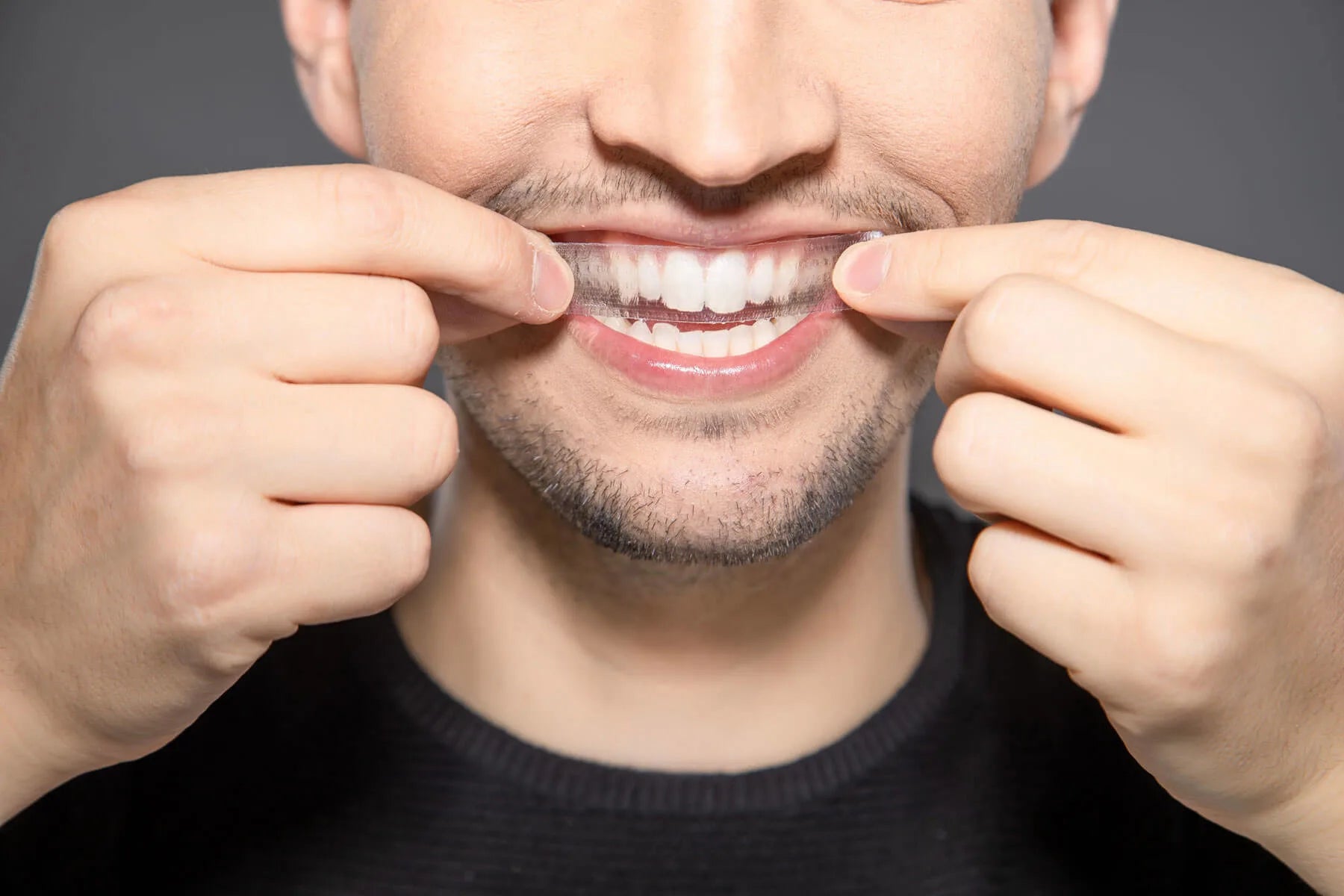Teeth whitening is a common dental procedure that millions of people go through. It is an easier and more affordable procedure than the rest of the dental treatments. There are several types of teeth whitening procedures that you can opt for based on your preference and tooth condition. Teeth whitening strips, whitening gel, dental bonding, veneers and natural remedies are very easy to do. However, teeth stains and discolouration are not permanent, so it is easily preventable with regular brushing and maintaining good oral health.
How Whitening Strips Work
Teeth whitening strips are one such teeth whitening procedure. It is easy to use and also more affordable than the rest. They can brighten the enamel with a tone-up. The teeth whitening strips are thin, plastic strips are covered with a whitening gel. These strips contain hydrogen peroxide or carbamide peroxide which penetrate the enamel and work to lighten discolouration. Teeth whitening strips are enamel-safe until you overuse them.
The use of whitening strips is easy. You need to put the strip in the front of your teeth and leave it for 20 minutes. The saliva in your mouth will play its role in softening the strip.

Immediate Effects of Whitening Strips
After wearing a whitening strip, you can see the effects on your teeth within an hour. You can notice-
Bright Teeth- Whitening strips can brighten your teeth within a few hours of treatment.
Remove Stains- Whitening strips can even remove coffee and tea stains on teeth with one or two rounds of usage.
Improve oral health- Whitening strips can help remove bacteria from the teeth and prevent tooth decay.
There are also side effects of whitening strips. Are whitening strips bad for your teeth?
Tooth Sensitivity- Whitening strips contain bleaching agents which can cause sensitivity. This bleaching agent can affect the dentin of your teeth.
Gum Irritability- The bleaching can irritate your gum and cause pain and discomfort.
Uneven Colour- Whitening strips can cause uneven colour. Some teeth may appear whiter than the rest.
Affect Enamel- Whitening strips can be considered bad for enamel if used severely. Therefore, teeth whitening strips are not enamel-safe in such cases.
Long-Term Effects of Whitening Strips on Teeth
Are whitening strips bad for your teeth? Yes, they are. Regular use of whitening strips can damage your teeth.
Tooth Sensitivity- Excessive use of whitening strips can cause tooth sensitivity causing pain and discomfort.
Enamel Erosion- Whitening strips contain bleaching agents which can wear off the enamel leaving it exposed to cavities and other dental diseases.
Tooth Damage- Your tooth can be damaged due to overuse of whitening strips. It is a gradual process starting with the enamel getting exposed which leads to cavities and then tooth loss.
Allergic Reaction- Whitening strips can cause some reaction to the skin around such as itching, swelling and rashes.

Long-Term Effects on Gums
Teeth whitening strips contain hydrogen peroxide which is a powerful chemical. Hydrogen peroxide can whiten your white but it also comes at a cost. With prolonged usage, the whitening strips can cause long-term effects on gums.
Bleeding Gums- While the enamel gets exposed, the gums also get exposed to bacteria which results in irritation of the gums causing a burning sensation, making gum overly sensitive and painful.
Gum Swelling- The bleaching agent in whitening strips irritates the gums and causes swelling and pain.
Burned Gums- Due to the bleach present in whitening strips, it provides a burning sensation.
Alternatives to Whitening Strips
Teeth whitening strips are bad for your teeth when they are used excessively. If you do not wish to use the whitening strips, you can go ahead with these methods to whiten your teeth.
Oil Pulling- A traditional method with lots of health benefits. Take a spoonful of coconut oil squish it in your mouth and then spit it out.
Baking Soda- Brushing your teeth with baking soda can remove stains and also prevent cavities and reduce plaque. Learn more about the benefits of using baking soda for teeth whitening here.
Intake fruits- Eat a lot of fruits which have a lesser colour impact and drink plenty of water.
Charcoal Toothpaste- You can use charcoal toothpaste regularly. Check Perfora’s Charcoal Toothpaste. Check out Perfora’s Charcoal Toothpaste.

Other professional treatments are dental bonding, porcelain veneer, dental crowns and over-the-counter products.
Conclusion
Teeth whitening strips are easy and more affordable than other whitening treatments. However, excessive usage can cause long-term damage to the enamel, teeth and gums. Teeth whitening strips are only bad for your teeth if you overdo it, if you limit the frequency then you can also enjoy flawless teeth.
Frequently Asked Questions
1. Do whitening strips damage your teeth?
Answer- Yes, whitening strips can damage the teeth if they have been used excessively. Whitening strips contain bleaching agents which can damage the enamel of the teeth.
2. Are teeth whitening strips recommended by dentists?
Answer- In some cases, dentists do recommend whitening strips but it can only be fruitful if you use them right and by the procedure your dentist has recommended.
3. Are whitening strips safe to use daily?
Answer- Yes, it is safe to use whitening strips but be careful with extra usage. Always consult with your dentist and read the manufacturer's instructions carefully before using.






